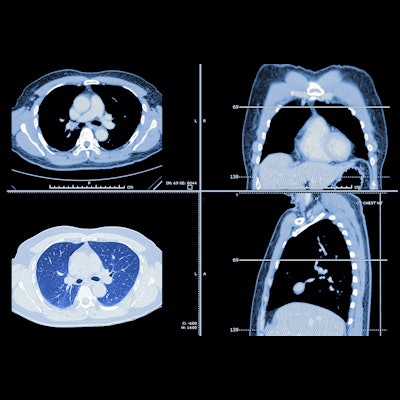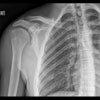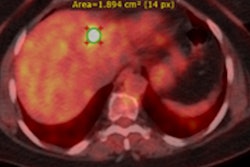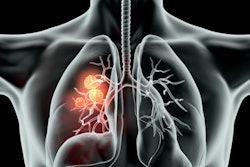
Screening smokers and ex-smokers could reduce lung cancer mortality by as much as 16%, according to the findings of a large U.K. study published on 11 September in Lancet Regional Health -- Europe.
The latest results of the UK Lung Cancer Screening Trial (UKLS) trial of single low-dose CT are broadly in line with those of the Dutch-Belgian Randomized Lung Cancer Screening (NELSON) and National Lung Screening Trial (NLST) studies, and they provide unequivocal support for lung cancer screening in identified risk groups, noted first author Prof. John Field, PhD, chair of molecular oncology at the University of Liverpool and chief investigator for the UKLS, and colleagues.
The UKLS trial focused on 3,968 people in Liverpool and Cambridge, England, between the ages of 50 and 75. Around 75% of the individuals were men, and the median age was 68.
The researchers identified all of the participants as being at risk of developing lung cancer over the next five years. Between October 2011 and February 2013, just over half (1,987) had a CT scan, while the others (1,981) received normal National Health Service (NHS) care but were not scanned.
Every participant was followed up for seven years. A total of 86 cancers were detected over that period among those who were screened, but only 75 were found over seven years among those who had received normal care. There were 46 deaths over seven years among those who had not had a CT scan, compared with 30 in the group that had been screened.
Further details about the team's findings on the lung cancers are provided in the two tables below.
| Lung cancers by stage -- number (%) | ||||
| Stage* | Screen Detected (%) | Subsequent Cancer# (screening arm) | Screening Total (%) | Control Total (%) |
| IA | 22 (52.4) | 15 (53.6) | 37 (52.9) | 8 (14.5) |
| IB | 5 (11.9) | 3 (10.7) | 8 (11.4) | 4 (7.3) |
| IIA | 7 (16.7) | -- | 7 (10) | 4 (7.3) |
| IIB | 1 (2.4) | 1 (3.6) | 2 (2.9) | 2 (3.6) |
| IIIA | 5 (11.9) | 2 (7.1) | 7 (10) | 4 (7.3) |
| IIIB | (0) | 2 (7.10) | 2 (2.9) | 6 (10.9) |
| IV | 2 (4.8) | 5 (17.9) | 7 (10) | 27 (49.1) |
| NA | -- | 16 | 16 | 20 |
| Total | 42 | 44 | 86 | 75 |
| Lung cancers by histological type -- number (%) | ||||
| Histology | Screen Detected | Subsequent Cancer (screening arm)# | Screening Total | Control |
| Adenocarcinoma | 25 (59.5) | 19 (43.2) | 44 (51.2) | 26 (34.7) |
| Squamous cell carcinoma | 12 (28.6) | 7 (15.9) | 19 (22.1) | 18 (24) |
| NSCLC NOS* | 0 (0) | 1 (2.3) | 1 (1.2) | 2 (2.7) |
| Small cell carcinoma | 3 (7.1) | 6 (13.6) | 9 (10.5) | 8 (10.7) |
| Carcinoid/Large Cell | 1 (2.4) | 0 (0) | 1 (1.2) | 4 (5.3) |
| NOS | 1 (2.4) | 11 (25) | 12 (14) | 17 (22.7) |
| Total | 42 | 44 | 86 | 75 |
The latest analysis is likely to prompt renewed calls from lung cancer screening supporters for CT scans for all those who are at risk because of their smoking history -- the authors' hope being that early detection means more patients can have potentially curative surgery or radiotherapy.
"Lung cancer early detection and surgical intervention saves lives," Field told the Guardian newspaper in an article posted on 12 September.
In the U.K., about 47,000 patients a year are diagnosed with lung cancer, and 35,000 die of the disease, the report continued.
"In the U.K., only one-quarter of new cases of lung cancer are caught at an early stage when treatment with curative intent can be offered. By contrast, around 75% of lung cancers identified through CT screening studies are early stage, and can be treated by surgical removal or radiotherapy," said Dr. Robert Rintoul, chair of the UK Lung Cancer Coalition's clinical advisory group and a co-author of the study.
Rintoul added that the trial findings underlined that "national lung cancer screening programmes are urgently needed."
The results are now being sent to the UK National Screening Committee, which advises government ministers. Prof. Anne Mackie, Public Health England's director of screening, said the analysis would inform the committee's ongoing discussions about whether to recommend screening of at-risk groups.
Meanwhile, NHS England is undertaking trials of lung cancer CT screening in various parts of the country, the Guardian concluded.



















